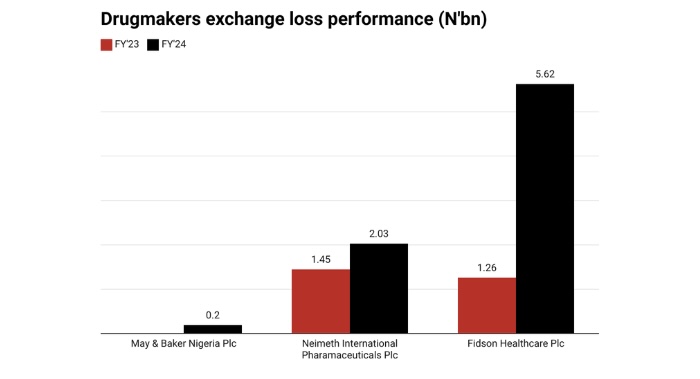Do you know that one of the very things you should be pray for daily in Nigeria is that you would not fall ill. In the midst of the hardship, people are paying through their nose to get medicine in Nigeria, and this cost lands on the already meagre salary.
Often, people are quick to blame it on President Bola Tinubu who took away Petrol Subsidy without proper cushion for the unpalatable situation it would create.
That is in the past, but many things fall on the centre of the trouble and if the centre cannot hold… what will the common ban do?

We are approaching the end of a second year that Nigeria is under the leadership of President Tinubu.
One of the sectors that is feeling the heat of the government’s policy and reforms is the pharmaceuticals.
Year Of Losses
For instance, Nigeria’s pharmaceutical industry is struggling under the weight of a weakening naira, with three listed firms—Fidson Healthcare, Neimeth International Pharmaceuticals, and May & Baker Nigeria— reporting a combined ₦7.86 billion in foreign exchange losses in 2024.
As the naira weakens, the cost of medicine in Nigeria is rising.
Pharmaceutical firms, heavily reliant on imported raw materials, are grappling with mounting foreign exchange losses.
Fidson Healthcare faced the steepest loss at ₦5.62 billion, up from ₦1.26 billion in 2023.
Despite a 58.5% revenue increase to ₦84.1 billion, its finance costs surged by 160%, reflecting the pressure of forex volatility.
Neimeth recorded a ₦2.03 billion forex loss, a staggering jump from ₦1.26 million the previous year, while revenue rose 102% to ₦4.46 billion, though pharmaceutical income fell by 38%.
May & Baker Nigeria reported a forex loss of ₦196 million, alongside a 47% revenue increase to ₦28.9 billion, aided by a 16% drop in administrative costs.
Read Also; Figures: See How Much Time You Spend On The Internet In A Year
Industry experts warn that Nigeria’s pharmaceutical sector is heavily reliant on imports, making it highly vulnerable to currency fluctuations.
Higher Price of Medicine In Nigeria
This fluctuation is what is reflecting in the medicine that you buy in Nigeria. In fact, it is giving a negative consequence, resulting in manufacturing of fake medicine in the land.
More so, Gabriel Idahosa of the Lagos Chamber of Commerce and Industry noted that rising import costs could lead to higher medicine prices and potential shortages in Nigeria, forcing some multinational companies to exit the market.
A temporary relief came on January 30, when the naira appreciated to ₦1,485.95 per dollar, its strongest level in seven months, driven by CBN policies.
However, until the currency stabilises, pharmaceutical firms will continue to battle forex losses, threatening profitability and medicine affordability in Nigeria.
This will mean that your regular Panadol and the rest will become even more expensive for these companies to stay afloat.

